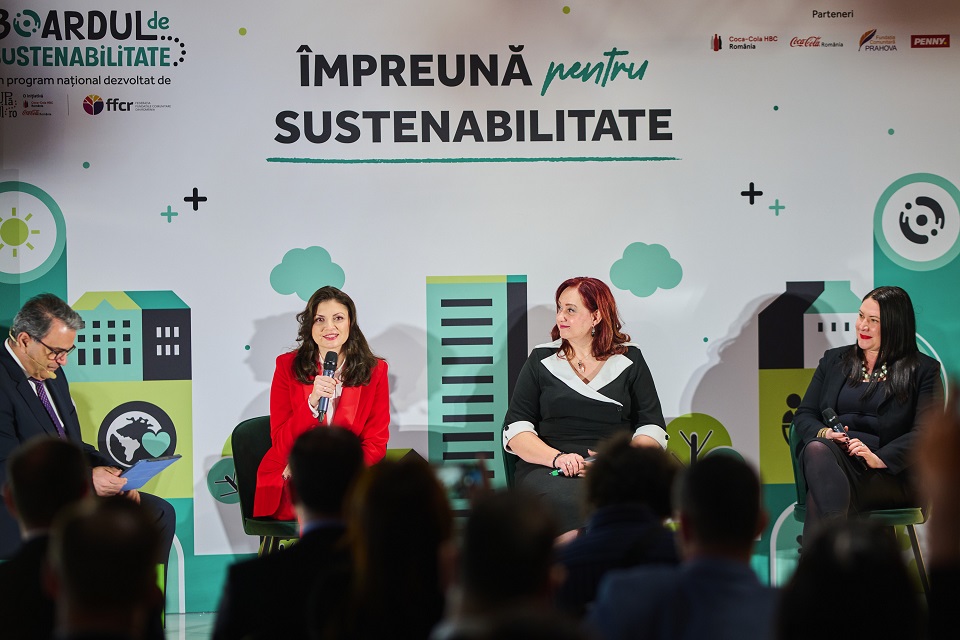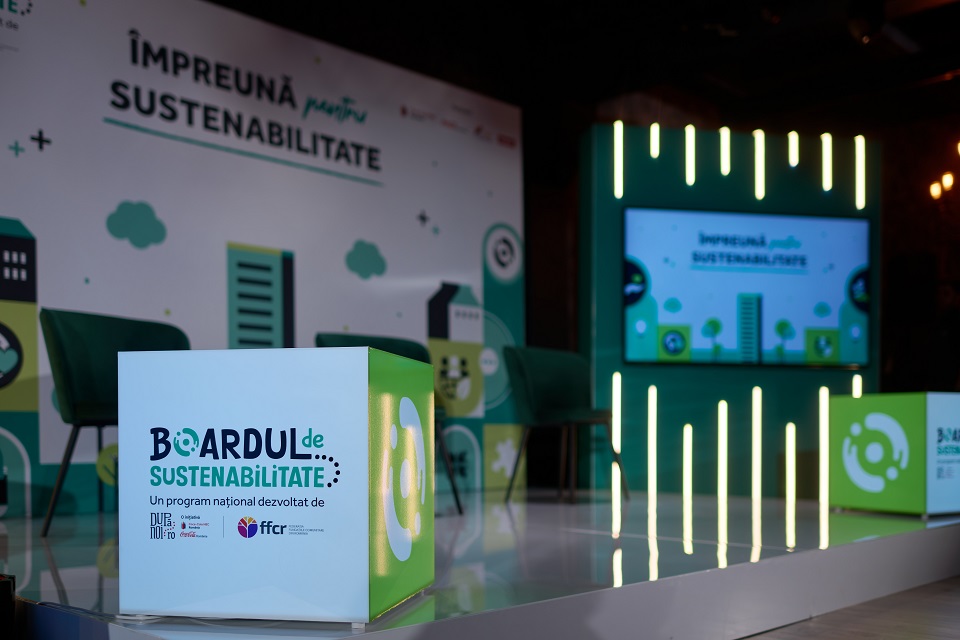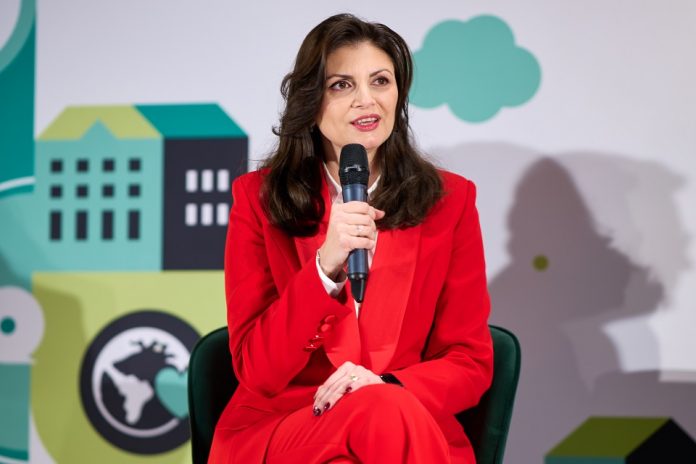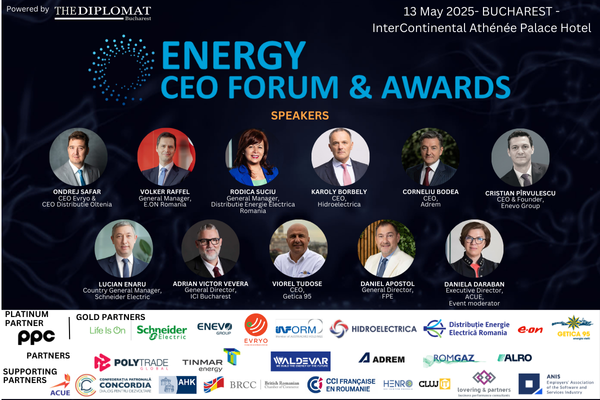Recently, Coca-Cola HBC Romania and the Federation of Community Foundations in Romania launch the Sustainability Board – a national program that proposes a unique collaboration model, integrating for the first time relevant actors from the public-private sector in a joint effort for a more sustainable future in communities in Romania.
With an initial investment of 200,000 euros from Coca-Cola HBC Romania, for the first 2 years of activity, the program has the ambition to double its resources through strategic collaborations with other partners, thus contributing to expanding the impact. The first private partner to join the initiative is PENNY Romania.

We spoke with Alice Nichita – Corporate Affairs and Sustainability Director at Coca-Cola HBC who detailed on the national program’s objectives and impact in the local economy.
What are the main objectives of the Sustainability Board program and how does it align with Coca-Cola HBC’s sustainability strategy?
At Coca-Cola HBC, we see sustainability not just as a responsibility but as a strategic opportunity—and the Sustainability Board is our commitment to making real, tangible progress in the communities we serve. The Sustainability Board is a strategic collaboration framework designed to develop scalable, long-term sustainability solutions across communities in Romania. Through this initiative, we bring together private sector leaders, NGOs, and public authorities to co-create impactful, sustainable projects that directly address local needs. The Sustainability Board is fully aligned with Coca-Cola HBC’s sustainability vision, which is built around four strategic pillars:
• Environmental Protection – Reducing our carbon footprint, advancing the circular economy, and ensuring efficient waste management.
• Water Stewardship – Managing water resources responsibly to ensure long-term conservation and sustainable usage.
• Youth and Community Development – Supporting education, skills development, and economic empowerment to create stronger, more resilient communities.
• Partnerships for Impact – Strengthening collaborations with businesses, NGOs, and government stakeholders to drive scalable, systemic change.
Our primary objective is to create lasting change by developing relevant, high-impact projects and forming effective, long-term partnerships.

What role does the Federation of Community Foundations of Romania play in this project and how does it contribute to achieving the program’s objectives?
The Federation of Community Foundations of Romania (FFCR) is a founding partner and national program operator of the Sustainability Board, ensuring that the initiative is strategically aligned with local needs, efficiently implemented, and scalable for long-term impact. With a network of 16 community foundations, FFCR plays a critical role in identifying community needs, managing funding, and facilitating multi-stakeholder collaboration to drive sustainability efforts at the grassroots level.
Its role includes overseeing research, project selection, and resource allocation, ensuring that sustainability initiatives are impactful and measurable. Over the next six years, FFCR will coordinate the program’s expansion across multiple regions. In Ploiești, during the first two years, FFCR provides strategic direction while the Prahova Community Foundation (Fundația Comunitară Prahova) leads the local implementation of initiatives.
What long-term changes do you want to see in local communities through the implementation of this program?
Our goal is to shift from short-term, fragmented sustainability efforts to a cohesive, long-term strategy that improves environmental, social, and economic conditions. Through this program, we aim to see:
• More sustainable communities – Encouraging circular economy practices, better resource management, and stronger local engagement to build greener, more resilient environments.
• Public-private partnerships with a shared mission – Bringing together companies, local governments, and NGOs to collaborate effectively and drive meaningful, long-term change.
• Scalability and national expansion – Developing and refining solutions in Ploiești that can be adapted and implemented in other communities, ensuring widespread impact.
By embedding sustainability into community structures and fostering long-term collaboration, the Sustainability Board empowers local actors to lead their own transformation, creating a lasting, self-sustaining impact.
How do you see this type of partnership expanding in the future to include new actors, such as private companies or academic institutions?
The Sustainability Board was designed as an open, scalable collaboration model, and its long-term success depends on engaging a diverse range of partners who bring expertise, resources, and innovation. As we expand, we aim to broaden participation by attracting private companies, and other key stakeholders who can enhance the program’s impact. We have already partnered with the University of Petroleum and Gas in Ploiești to conduct the first local research mapping community sustainability needs. Furthermore, we remain committed to strengthening connections with potential partners across various sectors.
What are the first projects under the Sustainability Board, and how will their impact be measured?
Building on the research conducted with the University of Petroleum and Gas in Ploiești, the Sustainability Board is launching its first two years of activity in the city with three key initiatives:
• Civiteca – Ploiești’s First Community Hub – A collaborative space for sustainability education, civic engagement, and environmental initiatives, bringing together residents, businesses, and NGOs.
• “Sustainable Neighborhoods” Microgrant Program (€20,000) – Supporting 4-6 local projects focused on urban greening, and circular economy solutions.
• A flagship project under development – Designed in partnership with local stakeholders, with the first co-creation session already completed.
The Federation of Community Foundations of Romania (FFCR) and the Prahova Community Foundation ensure the effective allocation of resources and track progress through community engagement levels, environmental improvements, and long-term adoption of sustainability practices.
What is the role of local authorities in the success of this program and how will you ensure effective collaboration between local authorities and the NGOs involved?
Local authorities play a key role in facilitating the implementation of the Sustainability Board’s initiatives, ensuring that projects are effectively integrated into the community and reach the people who need them most. Their involvement helps accelerate project execution, remove logistical barriers, and provide the necessary infrastructure and institutional support to scale sustainability efforts. By working closely with NGOs, they help transform sustainability into a shared, long-term commitment with tangible benefits for residents.
To ensure effective collaboration, we facilitate regular working sessions where local authorities and NGOs align priorities, share insights, and co-develop solutions based on community needs. Transparent decision-making and open communication are key, ensuring that NGOs bring expertise in community engagement and project execution, while local authorities provide the institutional backing needed to sustain and scale impactful initiatives.
How can interested NGOs get involved or propose projects within the Sustainability Board?
NGOs can engage with the Sustainability Board in three key ways:
• Applying for microgrants – NGOs can submit proposals for community-driven projects under initiatives like Sustainable Neighborhoods, which funds urban greening, waste management, and circular economy solutions.
• Partnering on existing initiatives – NGOs can collaborate with the Prahova Community Foundation and FFCR to support projects like Civiteca or contribute expertise to the Board’s proprietary sustainability initiative.
• Proposing new projects – The Board welcomes innovative ideas that align with community needs and program objectives. NGOs can participate in open calls for proposals and co-working sessions to help shape future initiatives.
For collaboration opportunities, organizations can contact the Sustainability Board team at sonia.constantin@ffcr.ro.
What are the biggest challenges you anticipate in implementing the projects, and how do you intend to overcome them?
One of the main challenges has been ensuring that the Sustainability Board is more than just a platform for discussion—it needs to drive real, measurable action. To achieve this, we’ve built a structured model where every partner plays a clear role. PENNY Romania was the first to join, demonstrating that a well-defined approach builds trust and encourages meaningful contributions.
Another key challenge is moving from strategy to measurable results. To ensure this, we set clear objectives based on research and community input, making sure projects address real needs. Civiteca and the microgrant program are already tangible examples of this approach.
Aligning different perspectives is also crucial, which is why we prioritize open dialogue, structured collaboration, and data-driven decisions. By staying focused on shared goals and scaling what works, we ensure long-term impact and the expansion of successful projects to more communities.




